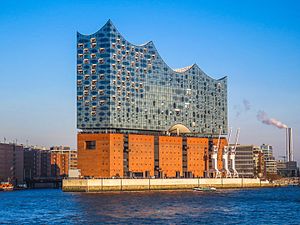
Back Elbphilharmonie Afrikaans Elbphilharmonie ALS دار أوكسترا إلبه Arabic Эльбская філармонія Byelorussian Labská filharmonie Czech Elbphilharmonie Danish Elbphilharmonie German Φιλαρμονική του Έλβα Greek Elbphilharmonie Esperanto Filarmónica del Elba Spanish
 | |
 | |
| Address | Platz der Deutschen Einheit 20457 Hamburg, Germany[1] |
|---|---|
| Coordinates | 53°32′29″N 9°59′03″E / 53.54139°N 9.98417°E |
| Public transit | 72 Elbphilharmonie (50 m) |
| Type | Concert hall |
| Capacity | 2,100 (Großer Saal)[2] |
| Construction | |
| Opened | 11 January 2017 |
| Construction cost | 866 million € |
| Architect | Herzog & de Meuron |
| Website | |
| elbphilharmonie.de | |
The Elbphilharmonie (German pronunciation: [ˈɛlpfɪlhaʁmoˌniː] ⓘ; "Elbe Philharmonic Hall"), popularly nicknamed Elphi,[3][4] is a concert hall in the HafenCity quarter of Hamburg, Germany, on the Grasbrook peninsula of the Elbe River.
The new glassy construction resembles a hoisted sail, water wave, iceberg or quartz crystal resting on top of an old brick warehouse (Kaispeicher A, built in 1963) near the historical Speicherstadt. The project is the result of a private initiative by the architect and real estate developer Alexander Gérard and his wife Jana Marko,[5] an art historian, who commissioned the original design by the Swiss architecture firm Herzog & de Meuron,[6][7][2] who developed and promoted the project (since 2003 in cooperation with the Hamburg-based real estate developer and investor Dieter Becken) for 3.5 years until the City of Hamburg decided to develop the project by itself. It is the key project of the new Hafencity development and the tallest inhabited building in Hamburg, with a final height of 108 metres (354 ft).
The Elbphilharmonie was officially inaugurated with concerts of the NDR Elbphilharmonie Orchestra and a light show on 11 January 2017.[8][9][10]
- ^ "Visitor Information". Official Website. Retrieved 28 January 2017.
- ^ a b Cite error: The named reference
herzogwas invoked but never defined (see the help page). - ^ "Elphi entern". Baunetz Media GmbH. 28 May 2010. Retrieved 11 March 2017.; "Stars kommen zu "Elphi"-Konzerten". Welt. 15 April 2013. Retrieved 11 March 2017.
- ^ Mega, Voula P. (29 August 2018). Eco-Responsible Cities and the Global Ocean. Springer. p. 77. ISBN 9783319936802.
- ^ Joachim Mischke/Michael Zapf: „Elbphilharmonie Hamburg“, Edel Books Hamburg, 2016, pages 46–65
- ^ Staff (5 April 2007), River Tunes: Elbe Philharmonic Hall by Herzog & de Meuron, ArchNewsNow, retrieved 23 August 2008
- ^ Jaeger, Falk (May 2008), Waterfront Living and Working: Hamburg's HafenCity, Goethe-Institut, archived from the original on 2 June 2008, retrieved 23 August 2008
- ^ "Elbphilharmonie Opening: NDR Elbphilharmonie Orchester". Official Website. Archived from the original on 13 January 2017. Retrieved 11 January 2017.
- ^ Fonseca-Wollheim, Corinna da (10 January 2017). "Finally, a Debut for the Elbphilharmonie Hall in Hamburg". The New York Times. Retrieved 11 January 2017.
- ^ "Germans cheer new landmark as Hamburg concert hall opens". Reuters. 11 January 2017. Retrieved 11 January 2017.